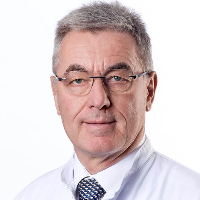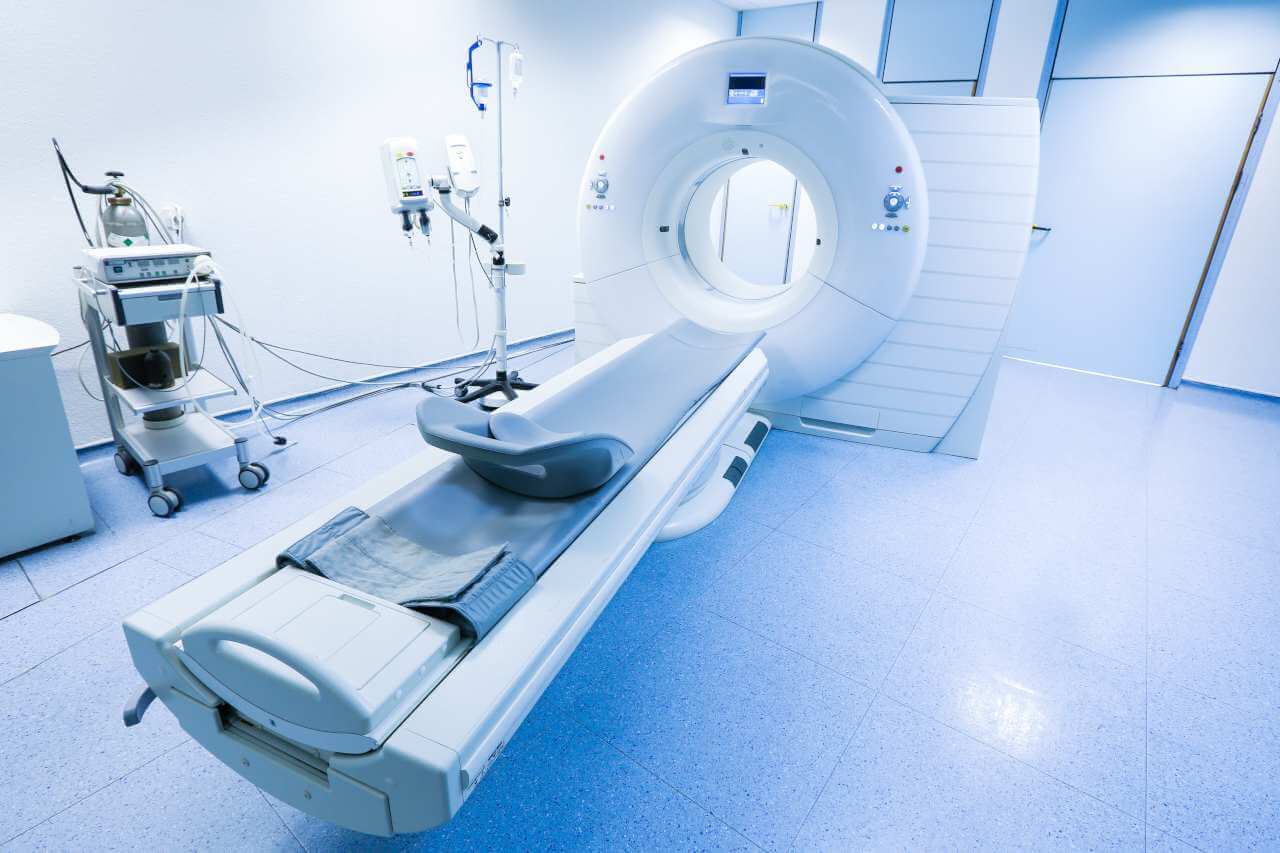
The program includes:
- Initial presentation in the clinic
- clinical history taking
- review of medical records
- physical examination
- urological examination
- laboratory tests:
- complete blood count
- general urine analysis
- biochemical analysis of blood
- inflammation indicators (CRP, ESR)
- indicators blood coagulation
- ultrasound of the urogenital system
- retrograde urography
- preoperative care
- transurethral lithotripsy
- symptomatic treatment
- control examinations
- the cost of essential medicines and materials
- nursing services
- full hospital accommodation
- explanation of future recommendations
Required documents
- Medical records
- Ultrasound scan (if available)
Service
You may also book:
 BookingHealth Price from:
BookingHealth Price from:
About the department
The Department of Urology and Andrology at the Meoclinic Hospital Berlin offers the full range of medical services in the fields of its competence. The department's highly qualified doctors carry out comprehensive examinations of the urinary system, as well as of the reproductive system in men. The specialists of the medical facility strive to detect pathological changes in the early stages, so urologists always recommend their patients to undergo regular preventive check-ups. The therapeutic offer includes both conservative procedures and surgical interventions. Of particular interest is the treatment of benign and malignant neoplasms of the prostate, testicles, bladder and kidneys. In the field of surgical treatment, doctors use the most modern and reliable techniques: endourologic, minimally invasive and microsurgical techniques. The department offers a variety of innovative therapeutic methods, such as focal therapy for prostate cancer, low dose rate brachytherapy, en bloc resection of the bladder wall with a tumor, and others. The department's range of services is supplemented by the treatment of andrological diseases: erectile dysfunction, ejaculation disorders, male infertility, penile curvature, varicocele.
The department is headed by Prof. Dr. med. Manfred Beer. The specialist has more than 25 years of successful clinical experience. The doctor has performed over 50,000 surgical interventions for the treatment of prostate, bladder and kidney tumors. Prof. Manfred Beer is one of the pioneers in the field of laparoscopic and laser surgery.
Prostate cancer is one of the most common cancers in men. The risk of developing the disease increases after the age of 40, so the department's specialists recommend an annual preventive check-up by a urologist. The key diagnostic method is a prostate-specific antigen blood test. If the indicator is abnormal, an additional MRI- and ultrasound-guided fusion biopsy of the prostate gland is performed. Upon confirmation of the diagnosis, the attending physician proceeds to develop an individual treatment regimen. The most common first-line therapy is radical prostatectomy with the Da Vinci surgical system. Such an operation is characterized by minimal trauma, but at the same time it allows achieving excellent results. In addition, the robot-assisted intervention allows the patients to maintain potency, exclude urination disorders, reduce blood loss and pain. Nonetheless, radical prostatectomy is not the only treatment option for prostate cancer available in the department. Another effective and modern type of treatment is HIFU therapy (high-intensity focused ultrasound). As a rule, this procedure is indicated for patients with localized prostate cancer (T1/T2), cancer recurrence, after brachytherapy and in the presence of contraindications to surgical treatment. The department also provides low dose rate brachytherapy, which is an innovative type of contact radiotherapy for prostate cancer. The essence of the therapeutic procedure is to place a radioactive source near the tumor, which makes it possible to deliver the maximum dose of radiation directly to the pathological focus, while causing minimal damage to the healthy tissues.
The department's team of doctors also successfully deals with the treatment of benign prostatic hyperplasia. To treat the pathology, the medical facility uses modern techniques, such as Greenlight laser surgery, minimally invasive sparing treatment with water vapor using the REZÜM system and prostatic artery embolization. Each of the above mentioned procedures is characterized by minimal trauma and allows the patients to effectively get rid of the pathology. The urologists accurately study the clinical data of the patient, based on which they determine the procedure that will allow the patient to get rid of benign prostatic hyperplasia as efficiently as possible.
A special place in the department's clinical practice is occupied by the treatment of kidney diseases. The medical team admits patients with kidney failure, inflammatory kidney disease, kidney stone disease, polycystic disease and kidney cancer. If the kidney pathology is suspected, the specialists carry out comprehensive diagnostics, including a number of laboratory tests, kidney ultrasound, blood pressure measurement, as well as a biopsy for suspected oncology or glomerulonephritis. With the resulting diagnostic data, the attending physician prescribes the best treatment option – drug therapy or organ-preserving surgery. If the patient has a large neoplasm, a nephrectomy (kidney removal surgery) may be required.
The department's therapeutic offer is complemented by medical care for patients with erectile dysfunction, ejaculation disorders, low libido and male infertility. The treatment of andrological diseases involves the use of medications, and in some cases, doctors may resort to surgical techniques. For example, the patients with drug-resistant erectile dysfunction are recommended for penile prosthesis implantation. In addition, men with andrological diseases need to avoid stressful situations, reconsider their diet, get rid of excess weight, lead an active lifestyle and give up bad habits (smoking, drinking alcohol). If the man suffers from infertility, doctors offer him modern options for solving this problem, including microsurgical epididymal sperm aspiration (MESA), testicular sperm extraction (TESE), intracytoplasmic sperm injection (ICSI) and other procedures.
The department's range of medical services includes:
- Diagnostics
- Special prostate ultrasound scanning
- MRI- and ultrasound-guided fusion prostate biopsy
- Kidney and bladder ultrasound scanning
- Laboratory tests, including hormone testing
- Spermogram
- PSA test
- Treatment
- Conservative therapy
- Drug therapy
- Surgical treatment
- Interventions for prostate diseases
- HIFU therapy for prostate cancer
- Greenlight laser therapy for benign prostatic hyperplasia
- Treatment of benign prostatic hyperplasia with the REZÜM system (sparing water vapor treatment)
- Low dose rate brachytherapy for prostate cancer
- Prostatic artery embolization
- Radical prostatectomy (da Vinci surgical system)
- Interventions for kidney stone disease
- Extracorporeal shock wave lithotripsy
- Ureterorenoscopy
- Percutaneous nephrolitholapaxy
- Percutaneous nephrostomy
- Interventions for urinary tract tumors
- Laser treatment of renal pelvis tumors
- Conventional organ-preserving surgery for kidney tumors
- Cystectomy (total bladder removal)
- Vasectomy (male sterilization)
- Interventions for infertility in men
- Microsurgical epididymal sperm aspiration (MESA)
- Testicular sperm extraction (TESE)
- Intracytoplasmic sperm injection (ICSI)
- Interventions for prostate diseases
- Conservative therapy
- Other diagnostic and therapeutic options
Curriculum vitae
University Education and Postgraduate Training
- 1977 - 1980 Postdoctoral Fellow at the Institute for Surgical Research, development of extracorporeal shock wave lithotripsy / T cell immunology, Ludwig Maximilian University of Munich.
- 1981 Admission to medical practice.
- 1983 Thesis defense, T cell immunology.
- 1986 Board certification in Urology.
- 1989 Venia legendi, Ludwig Maximilian University of Munich.
- 1995 Extraordinary Professorship, Charite University Hospital Berlin.
Professional Career
- 1987 Senior Physician, Department of Urology, University Hospital of Ludwig Maximilian University of Munich.
- 1988 Head, Department of Urology, University Hospital of Ludwig Maximilian University of Munich.
- 1989 - 1993 Senior Physician, Department of Urology, University Hospital Heidelberg.
- 1993 - 2016 Head Physician, Department of Urology, St. Francis Hospital Berlin.
- Since 2018 Work in the Private Urology Practice "Am Roseneck" and performing surgeries in the Department of Urology at the Vivantes Humboldt Hospital.
- Head of the Department of Urology and Andrology at the Meoclinic Hospital Berlin.
Innovative Developments
- 1989 Laser treatment of prostate diseases, Heidelberg University.
- 1990 Development of the laparoscopic surgical technique in urology, Heidelberg University.
- 1994 Introduction of minimally invasive surgery, St. Francis Hospital Berlin.
- 1996 Development of a modern therapy for kidney stone disease: ureterorenoscopy and extracorporeal shock wave lithotripsy, St. Francis Hospital Berlin.
- 2000 Development of urogynecology and pelvic reconstructive surgery, St. Francis Hospital Berlin.
- 2004 Development of the direction of radical surgery for pelvic tumors, St. Francis Hospital Berlin.
- 2009 Development of organ-preserving surgery for kidney tumors and nephrourology, St. Francis Hospital Berlin.
- 2013 Introduction of HIFU prostate therapy, St. Francis Hospital Berlin.
- 2015 Introduction of prostate artery embolization, St. Francis Hospital Berlin.
Photo of the doctor: (c) Meoclinic
About hospital
The Meoclinic Hospital Berlin is one of Germany's most renowned multidisciplinary private hospitals offering top-class and patient-centered medical care. The hospital opened its doors to patients back in 2000 and today is deservedly proud of its vast experience. It has 28 specialized departments, each of which is responsible for the treatment of a particular group of diseases. A highly professional medical team consisting of 67 doctors takes care of the health of patients. The basis of the work of the doctors of the hospital is the use of the most advanced and, if possible, sparing treatment methods. The hospital is certified according to ISO 9001:2015 standards, so patients benefit from the highest level of the quality of service, adherence to hygiene and safety standards.
The hospital includes almost all fields of modern medicine: internal medicine, general and abdominal surgery, endocrine surgery, vascular surgery, hernia repair surgery, hand surgery, plastic surgery, pediatric surgery, cardiology, pulmonology, gastroenterology, rheumatology, proctology, gynecology, urology, ophthalmology, orthopedics, neurology, neurosurgery. To provide surgical treatment, the hospital has three high-tech surgical suites, which perform both minimally invasive interventions and DaVinci robot-assisted interventions, as well as the most complex operations lasting several hours. In addition, the hospital has an advanced Radiology Center with innovative devices for computed tomography, magnetic resonance imaging, ultrasound diagnostics and X-ray scanning. These resources allow providing accurate diagnostics and effective treatment of the highest European level.
Despite the fact that the hospital has advanced technologies and modern infrastructure, the focus of the medical staff is on the patient – his needs, wishes and well-being. During the treatment in this medical center, patients are surrounded by care, comfort, and they are treated with maximum respect and understanding. The doctors of the hospital use all their professionalism and medical knowledge for the benefit of patients, saving lives even in particularly complex cases.
Photo: (с) depositphotos
Accommodation in hospital
Patients rooms
The patients of the Meoclinic Hospital Berlin live in well furnished rooms, corresponding to the level of luxury five-star hotels. There is a fantastic view from the windows of the patient rooms on the Gendarmenmarkt, the Reichstag, the Friedrichstrasse or the courtyard of the hospital. The hospital has a pleasant atmosphere, which is also facilitated by soothing colors. The standard patient rooms include a comfortable bed, a bedside table, a desk and chairs, a wardrobe with a built-in safe for storing valuables, air conditioning, a minibar, a TV and a telephone. Free Wi-Fi is available in the patient rooms. Each patient room has an ensuite bathroom with shower and toilet, heated floor. There are bath slippers, towels and toiletries in the bathroom. A bathrobe, shower caps, shaving kit and hairdryer are available upon request.
Meals and Menus
The patients of the hospital are offered tasty and healthy three meals a day: breakfast, lunch and dinner. The menu mainly includes vegetable, fruit, poultry and fish dishes. Each patient has a choice of several menus, including traditional Russian and Arabic cuisine, as well as kosher and vegetarian meals.
If for some reason you do not eat all foods, you will be offered an individual menu. Please inform the medical staff about your dietary preferences prior to treatment.
Further details
Standard rooms include:
Accompanying person
Your accompanying person may stay with you in your patient room or at the hotel of your choice during the inpatient program.
Hotel
You may stay at the hotel of your choice during the outpatient program. Our managers will support you for selecting the best option.




